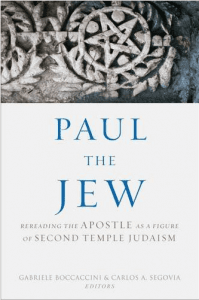 In his essay on the “Three Paths to Salvation of Paul the Jews,” in Paul the Jew, Gabriele Boccaccini contends the Lutheran Paul was successfully challenged by the new perspective but the new perspective did not escape the charge of supersessionism, and so in its place he proposes a Radical New Perspective. Here are his words:
In his essay on the “Three Paths to Salvation of Paul the Jews,” in Paul the Jew, Gabriele Boccaccini contends the Lutheran Paul was successfully challenged by the new perspective but the new perspective did not escape the charge of supersessionism, and so in its place he proposes a Radical New Perspective. Here are his words:
The New Perspective has tried hard to get rid of the most derogatory aspects of the traditional (Lutheran) reading of Paul (claiming that Judaism also should be regarded as a “respectable” religion based on grace), but has not challenged the view of Paul as the critic of Judaism and the advocate of a new supersessionist model of relations between God and humankind—God’s grace “in Christ” superseded the Jewish covenant for both Jews and gentiles by creating a third separate “race” (2).
A new paradigm is emerging today with the Radical New Perspective—a paradigm that aims to fully rediscover the Jewishness of Paul (2).
Before we get into the meat of his essay, I want to say that his definition of supersessionism is one of many. His emphasis appears to emphasize a “third race,” language from the early church but which has any number of evocations. To the degree that one believes God did something special and unique in Jesus of Nazareth to the same degree one runs up against some kind of charge of supersessionism. There are, then, kinds of supersessionism just as there are kinds of pluralism. Others besides N.T. Wright have found in Paul a kind of typical, sectarian Jewish form of supersessionism. Paul is no more nor no less supersessionistic than the Essenes/Qumran community.
Boccaccini is right: the issue is what kind of Jew Paul was (4). Paul was a convert, not from Judaism.
Paul, who was born and raised a Jew, remained such after his “conversion”; nothing changed in his religious and ethical identity. What changed, however, was his view of Judaism. … Paul did not abandon Judaism, but “converted” from one variety of Judaism to another. With Alan Segal, I would agree that “Paul was a Pharisaic Jew who converted to a new apocalyptic, Jewish sect” (5).
Paul was a Jesus follower, and he believed Jesus was the Messiah, and that in Jesus the messianic era had arrived. Then he became a missionary to the gentiles. His belief that Jesus forgave sins was perfectly Jewish, and here he explores the apocalyptic world of 1 Enoch with its view of the supernatural origins of sin. Instead of salvation by justice, salvation occurs by means of repentance and the mercy of God (8). This is the mission of Jesus: to procure salvation for others through repentance (and faith in him).
Paul, he argues, sides with the apocalyptic tradition that evil has a supernatural origin. Humans have lost the battle to sin and evil. The problem for Paul, as for Enoch, is not the Torah but human capture by sin and evil. The only remedy is God’s merciful liberation. He emphasizes the need to release Paul from 16th Century debates and free him for 1st Century theories of sin and enslavement to evil. Jesus liberated people by the mercy of God. Justification, however, is not salvation; one must continue in obedience (14). “Having equated “justification by faith” (which Paul preached) with “(eternal) salvation by faith” (which Paul never preached) is one of the major distortions of the Christian re interpretation of Paul” (14).
What got Paul in trouble? “While other members of the early Jesus movement seem more interested in a perspective of restoration of the twelve tribes of Israel (see the incipit of the letter of James), in Paul, there is a special emphasis on the inclusion of gentiles” (15). He did this through an apocalyptic theology.
Paul never claimed to have been the first to baptize gentiles. What is distinctive is the enthusiasm with which Paul devoted his life to preaching to gentiles. But there is something that is far more controversial. Paul seemed to have pushed for an equal status of gentiles within the new community (15).
The controversy was over “by faith alone.” Paul is in dispute with James. Jews and Gentiles are now at one but the distinction is not abolished. But consider this statement of Boccaccini’s:
In Paul’s view, Christ is God’s gift not to gentiles, but to sinners. The righteous (Jews and gentiles) will be saved if they have done good deeds. But Paul is conscious of the fact that the power of evil makes it incredibly difficult for all humankind to be righteous: for the Jews to follow the Torah and for the gentiles to follow their own conscience. He preaches the good news that, at the end of times, sinners (Jews and Gentiles alike) are offered the extraordinary possibility to repent and be justified in Christ by God’s mercy apart from God’s justice. Paul was not Lutheran: he never taught “salvation by faith only” to humankind, but announced to sinners, “justification (that is, forgiveness of past sins) by faith.” Paul did not preach only two ways of salvation, but rather three: righteous Jews have the Torah, righteous gentiles have their own conscience, and sinners—Jews and gentiles alike, who have fallen without hope under the power of evil—have Christ the forgiver (19).
That’s one way to avoid supersessionism. The question is, Is that how Paul operated?











